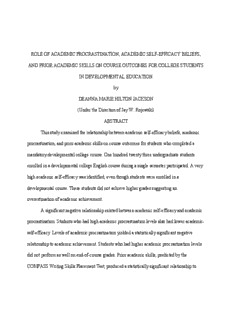
role of academic procrastination, academic self-efficacy beliefs, and prior academic skills on ... PDF
Preview role of academic procrastination, academic self-efficacy beliefs, and prior academic skills on ...
ROLE OF ACADEMIC PROCRASTINATION, ACADEMIC SELF-EFFICACY BELIEFS, AND PRIOR ACADEMIC SKILLS ON COURSE OUTCOMES FOR COLLEGE STUDENTS IN DEVELOPMENTAL EDUCATION by DEANNA MARIE HILTON JACKSON (Under the Direction of Jay W. Rojewski) ABSTRACT This study examined the relationship between academic self-efficacy beliefs, academic procrastination, and prior academic skills on course outcomes for students who completed a mandatory developmental college course. One hundred twenty three undergraduate students enrolled in a developmental college English course during a single semester participated. A very high academic self-efficacy was identified, even though students were enrolled in a developmental course. These students did not achieve higher grades suggesting an overestimation of academic achievement. A significant negative relationship existed between academic self-efficacy and academic procrastination. Students who had high academic procrastination levels also had lower academic- self-efficacy. Levels of academic procrastination yielded a statistically significant negative relationship to academic achievement. Students who had higher academic procrastination levels did not perform as well on end-of-course grades. Prior academic skills, predicted by the COMPASS Writing Skills Placement Test, produced a statistically significant relationship to academic achievement. Students with higher COMPASS scores achieved higher end-of-course grades. Older students and men had higher levels of academic procrastination. Students were most likely to procrastinate on studying for exams, weekly reading assignments, and completing writing assignments. Task aversiveness was the most important reason students gave for procrastinating. Younger students and men were more task averse. The fear of failure factor was not as important as task aversiveness as an explanation for academic procrastination. There was little difference between men and women on the fear of failure factor, which was different from the original study using the PASS (Solomon & Rothblum, 1984) in which women rated the fear of failure factor higher. Older students most often attributed fear of failure to academic procrastination. INDEX WORDS: ACADEMIC PROCRASTINATION, ACADEMIC SELF-EFFICACY, DEVELOPMENTAL EDUCATION ROLE OF ACADEMIC PROCRASTINATION, ACADEMIC SELF-EFFICACY BELIEFS, AND PRIOR ACADEMIC SKILLS ON COURSE OUTCOMES FOR COLLEGE STUDENTS IN DEVELOPMENTAL EDUCATION by DEANNA MARIE HILTON JACKSON BSW, The University of Georgia, 1981 M.S., Mercer University, 1997 A Dissertation Submitted to the Graduate Faculty of The University of Georgia in Partial Fulfillment of the Requirements for the Degree DOCTOR OF EDUCATION ATHENS, GEORGIA 2012 © 2012 DeAnna Marie Hilton Jackson All Rights Reserved ROLE OF ACADEMIC PROCRASTINATION, ACADEMIC SELF-EFFICACY BELIEFS, AND PRIOR ACADEMIC SKILLS ON COURSE OUTCOMES FOR COLLEGE STUDENTS IN DEVELOPMENTAL EDUCATION by DEANNA MARIE HILTON JACKSON Major Professor: Jay W. Rojewski Committee: Elaine Adams Myra Womble Electronic Version Approved: Maureen Grasso Dean of the Graduate School The University of Georgia August 2012 iv ACKNOWLEDGEMENTS I thank my husband, Bill Jackson, for his day-to-day support throughout this process. His love, devotion, and encouragement are a blessing to me. I also owe a debt of gratitude to my parents who instilled in me a lifelong love of learning. I will be forever grateful for their support of my dreams and educational goals. To my daughter Kathleen Jackson, we have shared our educational journeys and achievements, which makes this day very special. And last but not least, from the bottom of my heart thank you to all my family for listening, loving, and believing in me. You all never doubted this day would come. I am blessed to have such a great and loving family. To my advisor and major professor Dr. Jay Rojewski, your support and guidance have been tremendous. Over these years, you have challenged me to be the best scholar and student I could be. You were a mentor who understood that students must seek knowledge, challenge their thinking, improve their writing, and come away with a sense of pride. Through your words and actions you conveyed confidence in me, and I believed that as well. You are a scholar, a valued teacher, and a wonderful mentor. To my committee members and professors, Dr. Myra Womble and Dr. Elaine Adams you encouraged me with many words of personal and scholarly wisdom in completion of my doctorate. Your valuable insights and points of view guided my thinking, research, and writing, and I thank you both for your unselfish devotion. v TABLE OF CONTENTS Page ACKNOWLEDGEMENTS............................................................................................................iv LIST OF TABLES.......................................................................................................................viii LIST OF FIGURES........................................................................................................................ix CHAPTER 1 INTRODUCTION.........................................................................................................1 Rationale..................................................................................................................1 Purpose of Study......................................................................................................6 Theoretical Framework............................................................................................8 Importance of Study..............................................................................................10 2 REVIEW OF LITERATURE......................................................................................12 Developmental Education......................................................................................12 Students in Developmental Education...................................................................14 Impact of Developmental Education.....................................................................15 The COMPASS Test..............................................................................................19 Procrastination.......................................................................................................20 Theoretical Framework of Procrastination............................................................23 Academic Procrastination......................................................................................24 Social Cognitive Theory........................................................................................27 Academic Self-Efficacy.........................................................................................28 vi Theoretical Framework of Academic Self-Efficacy..............................................29 Academic Achievement.........................................................................................31 3 METHOD....................................................................................................................34 Purpose of Study....................................................................................................34 Research Questions................................................................................................35 Design....................................................................................................................35 Participants............................................................................................................37 Instrumentation......................................................................................................39 Procedure...............................................................................................................45 Data Analysis.........................................................................................................46 4 RESULTS....................................................................................................................49 Purpose of Study....................................................................................................49 Analysis of Research Questions............................................................................50 Multiple Correlation Analysis (MCA)...................................................................58 5 DISCUSSION..............................................................................................................67 Purpose of Study....................................................................................................67 Research Summary................................................................................................68 Results....................................................................................................................72 Discussion and Implications..................................................................................76 Recommendations for Future Practice...................................................................83 Recommendations for Further Research...............................................................86 REFERENCES..............................................................................................................................87 vii APPENDICES A DEMOGRAPHIC QUESTIONNAIRE.....................................................................104 B ACADEMIC SELF-EFFICACY SCALE STUDENTS (ASES)..............................106 C PROCRASTINATION ASSESSMENT SCALE FOR STUDENTS (PASS)..........110 D INFORMED CONSENT...........................................................................................116 viii LIST OF TABLES Page Table 1: Demographic Characteristics for Study Participants.......................................................38 Table 2: Data Collection Instruments, Score Ranges, and Indicators...........................................44 Table 3: Data Analysis for Research Questions............................................................................48 Table 4: Descriptive Statistics for Criterion and Predictor Variables...........................................51 Table 5: Academic Self-Efficacy for College Students in a Developmental Course....................52 Table 6: Prevalence of Academic Procrastination for College Students in a Developmental Course.............................................................................................................................54 Table 7: Fear of Failure and Task Aversiveness for College Students in a Developmental Course.............................................................................................................................57 Table 8: Residual Statistics for Criterion Variable Academic Achievement................................61 Table 9: Correlation Matrix for Academic Achievement..............................................................62 Table 10: Structure Correlations for Academic Achievement......................................................65 Table 11: Results of the Component Analysis for Academic Achievement.................................66
Description: